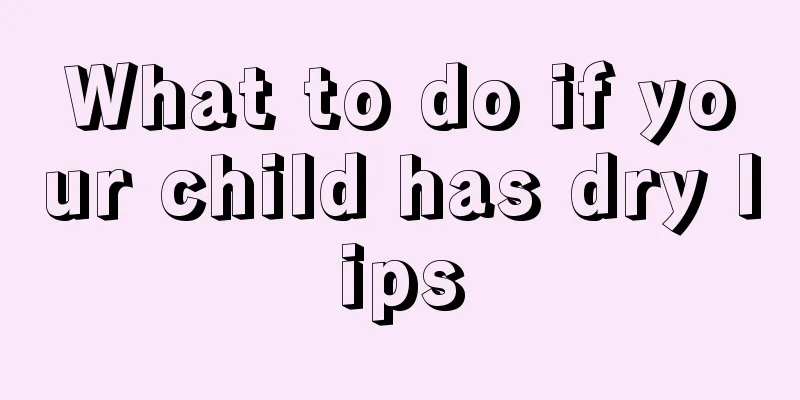Child's snot with blood

|
It is common to have a runny nose when you have a cold. Sometimes, there will be blood in the runny nose due to internal heat. If you are an adult, you usually don’t take it too seriously and just drink more water to reduce the internal heat. However, if a child has bloody snot, parents will be particularly worried. In fact, the same principle applies, it may be caused by getting too hot. The following introduces the possible reasons for baby's bloody nose. Parents, please take a look. Why does my baby's nasal discharge contain blood? Normally there is no need to worry. It may be caused by getting a fever. You can give your child more water to avoid catching cold and wind, and also keep the diet light. It is also possible that the nasal mucosa is too dry and cracked, resulting in bloody nasal discharge. You can eat foods rich in dietary fiber in your daily diet, especially the indoor temperature should not be too dry. No matter what the cause of this situation, it needs to be taken seriously. After all, children are young and cannot express clearly if they are unwell. Parents need to observe carefully and create a better space for their growth. Take your children outdoors more often to improve their immunity. If this problem occurs, don't let them pick their noses. It will be relieved soon and it won't be a big deal. Parents will be very nervous if their children show any discomfort. It is understandable that they love their children, but they need to deal with the problem calmly. Even if there is discomfort, there are experienced doctors who can treat it. Bloody nasal discharge is not a big problem. Through further dietary adjustments, drinking more water to promote diuresis and reduce internal heat, the problem will soon be relieved. What should I do if my baby has a runny nose? 1. Hot compress: Wet a towel with hot water and apply it to the baby's nose. If the towel is cold, change it to a hot one. Repeat this process several times. As the nasal mucosa shrinks when exposed to heat, the nasal cavity becomes more unobstructed and the sticky mucus becomes easier to hydrate and flow out. Be gentle when applying hot compress. If you find mucus in your baby's nostrils, you can first clean it with a cotton swab dipped in water; you can also slowly massage the baby's nose or both sides of the nose. 2. Soak your baby’s feet and drink more warm water: Soak your baby’s feet in warm water before going to bed. You can also add a few slices of ginger to the water to keep out the cold. But be careful not to overheat the water so as not to scald your baby. When the water gets cold, you can keep changing the water until sweat appears on the child's forehead and let the child drink more warm water. It helps the baby's blood circulation, thins the mucus, makes it easier to clean, and allows the baby to rest early. 3. Steaming and moisturizing the face: If you have a facial steamer at home, turn it on and point it towards the baby's face to let him come into contact with moisture and heat. Steam can moisten your baby's nasal cavity and drain a lot of mucus quickly and naturally. But be careful not to place the facial steamer too close to the baby to avoid hurting his delicate skin; and the usage time at one time should not be too long, about 3 minutes is enough. 4. Increase the indoor temperature or maintain a balance between indoor and outdoor temperatures: If the temperature drops or rises suddenly, the baby will easily have symptoms of runny nose and cold. Since babies are particularly sensitive to external environment and air stimulation, try to keep the indoor and outdoor temperatures balanced so that they will not suddenly feel overwhelmed when going out. If you don't go out, you can keep the indoor temperature at a comfortable level to relieve your baby's symptoms of nasal congestion and runny nose. 5. Cleaning the snot: When the baby has too much nasal secretion and heavy nasal sound, the mother can use a nasal aspirator to help the baby clean the snot. But be careful when using it. When sucking through one nostril, press the other nostril at the same time, and the effect will be better. In addition, the nasal aspirator can absorb a large amount of nasal mucus and secretions at one time. Before use, it is recommended that parents check whether there is any nasal mucus in the baby's nasal cavity. Keep the action gentle to avoid going too deep into the baby's nasal cavity to cause pain or injury. Clean it thoroughly after use. |
<<: How to treat children's lung qi deficiency
>>: What medicine to use for baby neck eczema
Recommend
What should I do if my baby has a high fever and convulsions?
Babies who are not in good physical condition are...
What causes sleepwalking in children? Parents must know
The problem of sleepwalking in children worries p...
Diet for children with intussusception
Intussusception in children is a relatively commo...
What is the cause of blurred vision in the child's right eye?
Because modern technology is relatively developed...
4 suggestions for baby's nutritious diet in summer
1. Food is light and nutritious Keep food as ligh...
Treatment of cough and fever in children
What should we do if a young child has a cough an...
There is secretion on the baby's underwear
When taking care of a female baby, parents must p...
Symptoms of pollen allergy in babies
For babies, their physical development is not yet...
How to treat neonatal jaundice
Newborns are prone to jaundice, which can be eith...
How to treat children's excessive liver fire? It turns out this is the way
As we all know, if children do not have an approp...
What to do if your skin itches due to scarlet fever
Scarlet fever causes large rashes on the skin tha...
Newborn baby crying all day and not sleeping
In our lives, many newborns often cry after they ...
What is the normal stool of a 50-day-old baby?
A baby's stool can reflect many problems. For...
How to guide your baby to squat and urinate
When the child can say some simple words, you can...
What should I do if my child doesn't listen in class?
Learning is the most important thing for children...









